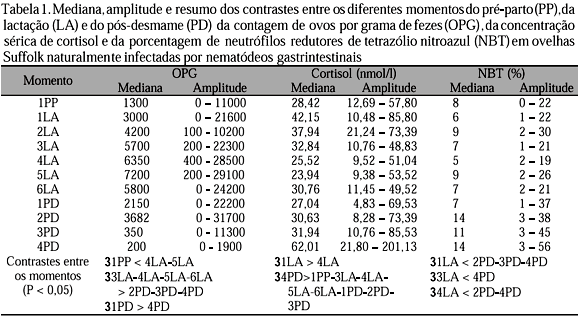The relationships between neutrophils oxidative metabolism, cortisol serum levels and worm burden, estimated by fecal egg count (EPG), were studied in sheep naturally infected by gastrointestinal parasites at the end of pregnancy, during lactation, and after weaning. Twenty-two Suffolk sheep three to four year-old, of same parity and season of parturition were used. Serum cortisol was determined by radioimmunoassay and the neutrophils oxidative metabolism by the nitroblue tetrazolium (NBT) reduction test. The highest EPG values were observed on the fifth week of lactation while the highest rates of cortisol and reduction of NBT occurred on the fourth week after weaning. A positive correlation (r = 0.52; P<0.01) was observed between the neutrophils capacity to reduce the NBT and the serum cortisol concentration in the pre-parturition period. Otherwise, the neutrophils oxidative metabolism decreased near to the parturition. A negative correlation (r = -0.39; P<0.01) between EPG and NBT reduction test was observed after weaning, which was coincident with the increase in the neutrophils capacity to reduce NBT, indicating that animals showing better immune response after weaning have neutrophils with higher oxidative metabolism and lower worm burden.
Ewe; oxidative metabolism; neutrophil; cortisol; gastrointestinal nematodes


